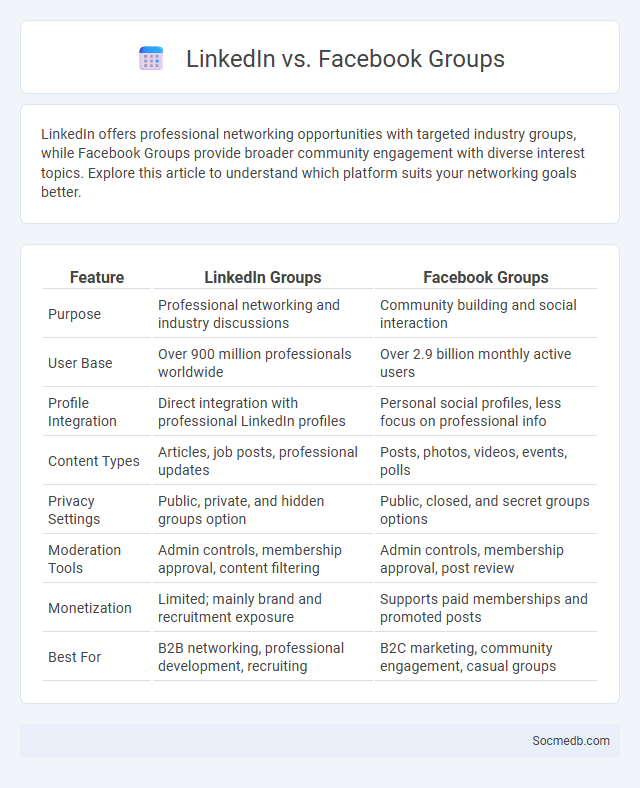
Photo illustration: LinkedIn vs Facebook Groups
LinkedIn offers professional networking opportunities with targeted industry groups, while Facebook Groups provide broader community engagement with diverse interest topics. Explore this article to understand which platform suits your networking goals better.
Table of Comparison
| Feature | LinkedIn Groups | Facebook Groups |
|---|---|---|
| Purpose | Professional networking and industry discussions | Community building and social interaction |
| User Base | Over 900 million professionals worldwide | Over 2.9 billion monthly active users |
| Profile Integration | Direct integration with professional LinkedIn profiles | Personal social profiles, less focus on professional info |
| Content Types | Articles, job posts, professional updates | Posts, photos, videos, events, polls |
| Privacy Settings | Public, private, and hidden groups option | Public, closed, and secret groups options |
| Moderation Tools | Admin controls, membership approval, content filtering | Admin controls, membership approval, post review |
| Monetization | Limited; mainly brand and recruitment exposure | Supports paid memberships and promoted posts |
| Best For | B2B networking, professional development, recruiting | B2C marketing, community engagement, casual groups |
Introduction to Online Community Platforms
Online community platforms are digital spaces designed to connect individuals with shared interests, facilitating interaction, collaboration, and content sharing. These platforms, such as Facebook Groups, Reddit, and Discord, provide tools for discussion, event organization, and networking, enhancing user engagement. Your participation in online communities can expand your social network, foster knowledge exchange, and build a sense of belonging.
Overview of LinkedIn Groups
LinkedIn Groups provide a dedicated platform for professionals to connect, share industry-specific insights, and collaborate on common interests or goals. These groups facilitate networking by enabling members to post discussions, ask questions, and exchange valuable resources within their professional communities. Active participation in LinkedIn Groups enhances visibility, fosters knowledge sharing, and supports career development across diverse sectors.
Exploring Facebook Groups
Facebook Groups serve as dynamic online communities where users with shared interests, hobbies, or professional goals connect and engage. These groups facilitate targeted discussions, event planning, and collaborative projects, enhancing communication beyond individual user pages. Leveraging Facebook Groups can drive niche marketing strategies and foster active user engagement by tapping into specific audience segments.
Understanding Niche Community Platforms
Niche community platforms cater to specific interests and demographics, fostering deeper engagement and stronger connections compared to mainstream social media. These platforms leverage targeted content and specialized features to enhance user experience within distinct groups such as gamers, creatives, or professionals. Marketers benefit from higher conversion rates by tapping into these focused audiences, who demonstrate increased loyalty and interaction.
Audience and User Demographics
Social media platforms attract diverse audience segments, with Facebook leading in users aged 25-34 and TikTok gaining popularity among teens and young adults. Instagram's user base predominantly consists of urban, tech-savvy individuals aged 18-29, while LinkedIn targets professionals across various industries. Understanding these user demographics helps marketers tailor content strategies to maximize engagement and reach specific consumer groups effectively.
Engagement and Interaction Features
Engagement and interaction features on social media platforms include likes, comments, shares, direct messaging, and live streaming, which foster real-time communication and community building. These tools enhance user experience by allowing Your audience to actively participate and respond to content, increasing visibility and connection. Effective use of these features drives meaningful interactions and boosts overall platform engagement.
Content Sharing and Moderation Tools
Social media platforms empower you to share diverse content formats, including photos, videos, and articles, enhancing communication and engagement. Content moderation tools use AI algorithms and human reviewers to detect and remove harmful or inappropriate material, ensuring a safe user environment. Effective moderation improves user experience by minimizing spam, hate speech, and misinformation across platforms like Facebook, Instagram, and Twitter.
Networking and Professional Opportunities
Social media platforms like LinkedIn, Twitter, and Facebook provide powerful networking opportunities by connecting professionals across various industries. By engaging with relevant groups and sharing insightful content, you can expand your professional network and discover new career prospects. Leveraging these platforms effectively enhances your visibility and access to industry-specific job openings and collaborations.
Privacy, Security, and Control
Social media platforms implement advanced encryption and multi-factor authentication protocols to enhance user privacy and security. Users gain granular control over their data with customizable privacy settings, enabling selective sharing and visibility restrictions. Ongoing updates in compliance with regulations like GDPR and CCPA ensure enhanced protection against unauthorized access and data breaches.
Choosing the Right Platform for Your Goals
Selecting the ideal social media platform depends on your specific goals, whether it's brand awareness, lead generation, or customer engagement. Platforms like Instagram excel in visual storytelling and influencer marketing, while LinkedIn is optimal for B2B networking and professional content sharing. Analyze your target audience demographics and behavior to align your content strategy with the platform's strengths for maximum impact.
 socmedb.com
socmedb.com